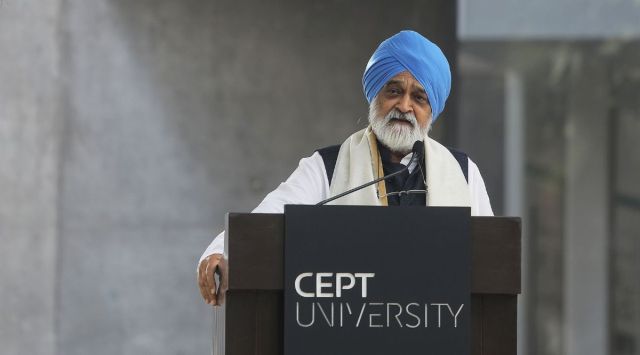Creating new states may help expand next layer of cities: Ahluwalia
“It is very important that state governments begin to realise that it’s not possible to project an image of a state that is ready to invite investments and provide an attractive environment for investments unless it is providing a liveable city.”
 Montek Singh Ahluwalia, who was the chief guest at the event, said that city planning was going to become very crucial because “we can’t go down building metropolitan cities”. (Express photo by Nirmal Harindran)
Montek Singh Ahluwalia, who was the chief guest at the event, said that city planning was going to become very crucial because “we can’t go down building metropolitan cities”. (Express photo by Nirmal Harindran) There is a need to expand non-metro cities in India and the solution, maybe, lies in creating more states and their capitals, said economist and former deputy chairman of erstwhile Planning Commission Montek Singh Ahluwalia here on Saturday.
Speaking at the 17th convocation of CEPT University in Ahmedabad on Saturday, Ahluwalia said, “City planning is going to become very crucial because we can’t go down building metropolitan cities’ routes… The idea that the new urban people are going to move into the existing metropolises is quite wrong. So we need the next layer of cities in India to expand hugely.”
 (From left) CEPT president Bimal Patel, economist Montek Singh Ahluwalia, and CEPT chairman Sanjay Lalbhai during 17th convocation of CEPT University. (Express Photo by Nirmal Harindran)
(From left) CEPT president Bimal Patel, economist Montek Singh Ahluwalia, and CEPT chairman Sanjay Lalbhai during 17th convocation of CEPT University. (Express Photo by Nirmal Harindran)
He said the expansion of non-metropolitan plus second-tier cities is entirely in the hands of state governments. “I have often felt that one of our problems is, the only time people are willing to think big about a city is when a new state capital has to be created. When a new state is created, it becomes a sub-national interest that we must have a terrific capital… Maybe the solution lies in having more states… Many of our states are becoming big enough. The size of Uttar Pradesh, for example, is probably larger than all except a handful of countries in the United Nations,” said Ahluwalia.
Talking about the benefits of having more states, he said: “If we have another five or six states, we would be planning another five or six state capitals and that would be a terrific boost to city planning — rational planning and looking into the whole thing ab initio in a way which would be a bit of a dream for city planners.”
“It is very important that state governments begin to realise that it’s not possible to project an image of a state that is ready to invite investments and provide an attractive environment for investments unless it is providing a liveable city.”
He said today’s generation of planners, architects and designers are better positioned compared to his own generation, when per capita income growth was much slower. “Most people think India could grow at 7.5 per cent over the next two decades if we do everything right, and I think it is feasible… Population growth is already slowing down. Over the next 20 years, in all probability, the average growth of population will be about 0.6 per cent. Then per capita income will grow at 6.9 per cent. What it means is, when we were younger, it would’ve taken us 45 years for per capita income to double and for you (current generation) it will take 10 years… This has huge implications, mainly because with change in structure of production comes change in applied technology,” said the eminent economist.
“India has traditionally been viewed as slow to urbanise but that pace is accelerating now because incomes are rising and people are moving to urban areas… So the need for new housing, including the quality of housing that has to be created, is probably larger than anywhere else in the world,” he said.
Ahluwalia was the chief guest at the CEPT convocation, which was held in-person after two years of virtual ceremonies due to Covid-19. A total of 608 students were conferred with degrees Friday. CEPT university president and acting director Bimal Patel announced that in 2021-22, the varsity disbursed approximately Rs 5.91 crore or roughly 13% of its total fees towards scholarships and assistantships, which benefited over 600 students. Patel declared that the university this year will host the CAADRIA conference (Computer-Aided Architectural Design Research in Asia).







